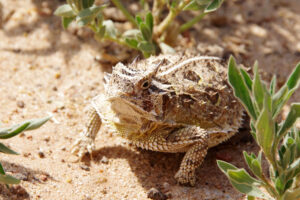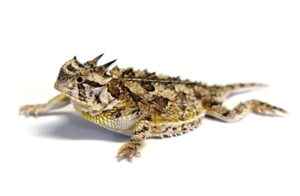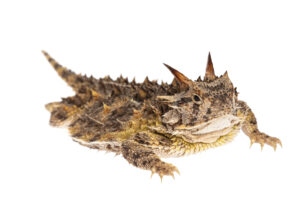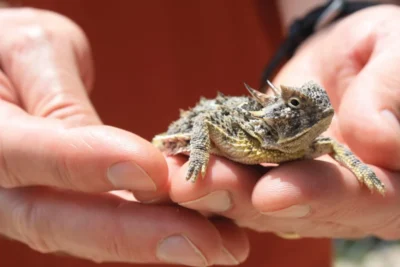Curious about adding a unique reptilian companion to your home? Wondering, ‘Can you have a horned lizard as a pet?‘ Delving into the world of exotic pets, let’s explore the fascinating possibility of welcoming a horned lizard into your life.
Whether or not you can have a horned lizard as a pet depends on various factors, including your location, local laws, and the availability of captive-bred specimens. In some areas, it may be legal to keep horned lizards as pets, while in others, they may be protected or restricted due to conservation concerns.
Horned lizards have specific care requirements, including a suitable habitat, proper diet, and environmental conditions. They typically thrive in arid or semi-arid regions and require a well-maintained terrarium with appropriate substrate, temperature gradients, and hiding spots.
Can horned lizards be kept as pets?

Horned lizards, also known as horned toads or horny toads, are fascinating creatures that captivate many reptile enthusiasts. However, keeping them as pets can be quite challenging and is generally not recommended for several reasons:
- Specialized Diet: Horned lizards have a specialized diet consisting mainly of ants. Their digestive system is adapted to efficiently process these insects. Recreating this diet in captivity can be difficult, and a lack of proper nutrition can lead to health issues.
- Specific Environment: Horned lizards require a specific environment that mimics their natural habitat. This includes sandy or gravelly substrates, hiding spots, and proper temperature and humidity levels. Creating and maintaining such an environment can be complex and costly.
- Legal Restrictions: In some areas, keeping horned lizards as pets may be illegal due to conservation concerns. Many species of horned lizards are protected due to habitat loss, collection for the pet trade, and other threats.
- Stress and Handling: Horned lizards are known to be sensitive to stress, and improper handling can exacerbate this. They may not adapt well to captivity and can suffer from stress-related health issues.
- Wild-Caught vs. Captive-Bred: While it may be tempting to catch a horned lizard from the wild, this can have serious consequences for wild populations. Additionally, wild-caught individuals may be more prone to stress and disease compared to captive-bred specimens.
Overall, while horned lizards are fascinating creatures, they are best admired in their natural habitat or in well-maintained captive breeding facilities where their complex needs can be met. For those interested in keeping reptiles as pets, there are many other species that are more suitable for captivity and easier to care for.
Characteristics of Horned Lizards
Horned lizards, also known as horned toads or horny toads, are a group of reptiles belonging to the genus Phrynosoma. They are characterized by several distinctive features:
- Horn-like Protuberances: One of the most striking features of horned lizards is their array of horn-like protrusions on their heads and bodies. These “horns” vary in size and shape between species but generally contribute to their unique appearance and serve as a form of defense.
- Spiny Skin: Horned lizards have a rough, spiny skin texture, which helps to deter predators. Their scales often have a bumpy or keeled appearance, adding to their distinctive look.
- Camouflage: Many horned lizard species have coloration and patterns that allow them to blend in with their surroundings, providing effective camouflage. This helps them avoid predators and ambush prey.
- Specialized Diet: Horned lizards are primarily insectivorous, with ants being a staple food source for many species. Their diet may also include other small invertebrates such as beetles and spiders. Their specialized digestive system is adapted to efficiently process their insect-rich diet.
- Defensive Behavior: When threatened, horned lizards employ several defense mechanisms. They may puff up their bodies to appear larger, display their spiky skin, and even squirt blood from their eyes as a deterrent to predators.
- Relatively Small Size: Horned lizards are generally small to medium-sized reptiles, with adults typically ranging from 2 to 5 inches in length, depending on the species. Some species may be larger or smaller, but they are generally not large animals.
- Habitat Preferences: Horned lizards inhabit a range of habitats, including deserts, scrublands, grasslands, and arid regions of North and Central America. They are often found in sandy or rocky areas where they can effectively blend in with their surroundings.
- Reproduction: Horned lizards typically reproduce by laying eggs, although a few species give birth to live young. Mating rituals and reproductive behaviors vary between species, but generally, females lay eggs in shallow burrows or in sandy soil.
These characteristics collectively contribute to the unique biology and ecology of horned lizards, making them intriguing subjects for study and admiration in both natural and captive settings.
Challenges of Keeping Horned Lizards as Pets

Keeping horned lizards as pets presents several challenges, making them less suitable for captivity compared to other reptile species. Some of the main challenges include:
- Dietary Requirements: Horned lizards have a highly specialized diet consisting mainly of ants. Recreating this diet in captivity can be difficult and expensive. Ants can be hard to source and may not provide all the necessary nutrients. Additionally, captive horned lizards may refuse to eat anything other than live ants, further complicating their dietary needs.
- Habitat Needs: Horned lizards require specific environmental conditions to thrive. This includes a habitat with sandy or gravelly substrates, hiding spots, and proper temperature and humidity levels. Creating and maintaining such an environment can be challenging and costly for pet owners.
- Stress Sensitivity: Horned lizards are known to be sensitive to stress, and improper handling or husbandry practices can lead to health issues. They may refuse to eat, become lethargic, or exhibit other signs of distress if not provided with suitable conditions.
- Legal Restrictions: In some areas, keeping horned lizards as pets may be illegal due to conservation concerns. Many species of horned lizards are protected due to habitat loss, collection for the pet trade, and other threats. It’s important for potential owners to research local regulations before acquiring a horned lizard as a pet.
- Limited Availability: Horned lizards are not commonly bred in captivity, so finding captive-bred specimens can be challenging. Most individuals available in the pet trade are wild-caught, which can have negative impacts on wild populations and may result in specimens that are more stressed and less adaptable to captivity.
- Health Issues: Captive horned lizards may be prone to health issues such as metabolic bone disease, respiratory infections, and parasites. Providing proper nutrition, habitat conditions, and veterinary care is essential for maintaining the health of captive horned lizards.
Overall, while horned lizards are fascinating creatures, they are best admired in their natural habitat or in well-maintained captive breeding facilities where their complex needs can be met. Potential owners should carefully consider these challenges before acquiring a horned lizard as a pet and ensure they have the knowledge, resources, and commitment to provide proper care.
Benefits of Keeping Horned Lizards as Pets
Keeping horned lizards as pets can offer certain benefits, although it’s important to note that they may not be suitable for everyone due to their specialized care requirements. Here are some potential benefits of keeping horned lizards as pets:
- Fascinating Behavior: Horned lizards exhibit intriguing behaviors, such as their unique defensive mechanisms like puffing up their bodies and squirting blood from their eyes when threatened. Observing these behaviors can be both educational and entertaining for pet owners.
- Educational Opportunity: Keeping horned lizards as pets can provide an educational opportunity for owners to learn about reptile biology, behavior, and ecology. Understanding their specialized diet, habitat requirements, and natural behaviors can foster a deeper appreciation for these fascinating creatures and the ecosystems they inhabit.
- Low Maintenance: Compared to some other reptile species, horned lizards are relatively low maintenance. Once their habitat is set up correctly, they typically require minimal daily care beyond feeding and monitoring their health and environmental conditions.
- Long Lifespan: With proper care, horned lizards can live for several years in captivity. This long lifespan allows owners to develop a lasting bond with their pets and enjoy their company for an extended period.
- Unique Appearance: Horned lizards have a distinctive appearance with their horn-like protrusions, spiny skin, and camouflaged coloration. Their unique appearance can make them visually appealing pets for reptile enthusiasts.
- Conservation Awareness: Keeping horned lizards as pets can raise awareness about the conservation challenges facing these species and their natural habitats. Responsible pet ownership includes supporting conservation efforts and promoting sustainable practices to help protect wild populations.
- Community Engagement: Horned lizard enthusiasts often form communities and online forums where they can share information, advice, and experiences related to keeping these reptiles as pets. Engaging with other hobbyists can provide support and camaraderie for pet owners.
While keeping horned lizards as pets can offer these benefits, it’s essential for potential owners to carefully consider the challenges associated with their care and ensure they have the knowledge, resources, and commitment to provide proper care for these unique reptiles.
Additionally, prospective owners should always prioritize acquiring captive-bred specimens from reputable breeders to support responsible pet ownership and conservation efforts.
Alternatives to Keeping Horned Lizards as Pets

For those interested in reptiles but hesitant to take on the challenges associated with keeping horned lizards as pets, there are several alternative species that may be more suitable for captivity. Here are some options:
- Bearded Dragons (Pogona spp.): Bearded dragons are popular reptile pets known for their docile nature, relatively easy care requirements, and friendly demeanor. They come in various colors and patterns and are generally good choices for beginners.
- Leopard Geckos (Eublepharis macularius): Leopard geckos are small, terrestrial geckos native to dry regions of Asia. They have distinctive spotted patterns and are known for their calm disposition and ease of care, making them popular pets for beginners and experienced reptile keepers alike.
- Crested Geckos (Correlophus ciliatus): Crested geckos are arboreal geckos native to New Caledonia. They are known for their unique appearance, including a crest of skin running from their eyes to their tail. Crested geckos are relatively easy to care for and do not require live insects as a staple diet, making them a good option for those who are squeamish about feeding insects.
- Ball Pythons (Python regius): Ball pythons are popular snake species known for their docile temperament, manageable size, and wide variety of color morphs. They are generally low-maintenance snakes and can thrive in captivity with proper husbandry.
- Corn Snakes (Pantherophis guttatus): Corn snakes are small to medium-sized snakes native to North America. They come in a variety of colors and patterns and are known for their docile nature, ease of care, and relatively low cost compared to other reptiles.
- Russian Tortoises (Agrionemys horsfieldii): Russian tortoises are small tortoise species native to Central Asia. They are relatively hardy and can adapt well to captive environments if provided with proper habitat conditions, including a suitable diet and adequate space for exercise.
- Blue Tongue Skinks (Tiliqua spp.): Blue tongue skinks are medium-sized lizards native to Australia and Indonesia. They are known for their distinctive blue tongue and docile temperament. Blue tongue skinks have relatively simple care requirements and can make excellent pets for reptile enthusiasts.
These are just a few examples of reptile species that may be more suitable for captivity than horned lizards, particularly for beginners or those looking for alternative options. Regardless of the species chosen, it’s essential for prospective reptile owners to research their care requirements thoroughly and ensure they can provide the necessary environment and husbandry to meet their pet’s needs.
Conclusion
While the appeal of having a horned lizard as a pet may be strong due to its unique appearance and low maintenance needs, it’s essential to consider the legal regulations, the lizard’s specific care requirements, and its well-being in captivity.
Before pursuing ownership, thorough research and understanding of the responsibilities involved are crucial. So, can you have a horned lizard as a pet? It’s possible, but it demands careful consideration and commitment to ensure the best possible outcome for both the lizard and its owner.

